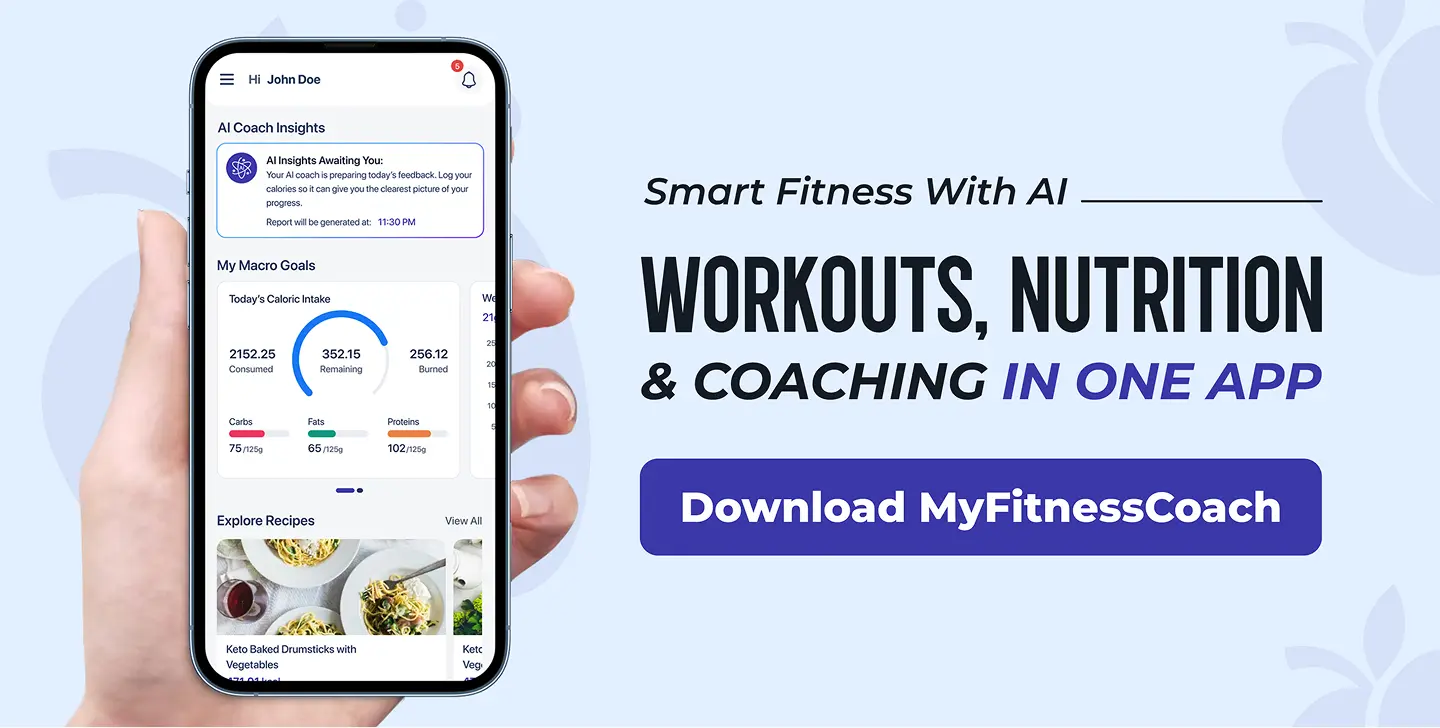What’s the Role of Fats in a Fitness Diet?

MyFitnessCoach
December 30, 2024
When it comes to building a healthy and effective fitness diet, fats often get a bad reputation. However, the truth is that fats are essential for your body to function properly and to support your fitness goals. In this article, we will explore the role of fats in a fitness diet, discuss their importance, and help you understand how to include the right fats for optimal health and performance. Let’s dive in!
How Fats Support Your Fitness Goals
Fats do more than just provide energy. Here’s how they specifically benefit those with fitness goals:
1. Long-lasting Energy
While carbohydrates are your body’s quick energy source, fats provide slow and sustained energy. This is particularly useful during long workouts or endurance activities.
2. Hormone Production
Fats are essential for producing hormones like testosterone and estrogen, which play critical roles in muscle building, recovery, and overall fitness.
3. Recovery and Inflammation Reduction
Healthy fats, especially omega-3 fatty acids found in fish, walnuts, and flaxseeds, help reduce inflammation and promote faster recovery after workouts.
4. Nutrient Absorption
Fats aid in absorbing fat-soluble vitamins (A, D, E, and K), which are crucial for energy metabolism, bone health, and immune function.
5. Cognitive Function
Fats also support brain health, vital for focus and concentration during workouts. Omega-3s are particularly beneficial for maintaining mental clarity.
How to Include Fats in Your Fitness Diet
To get the most out of fats, you need to choose the right sources and consume them in appropriate amounts. Here’s how:
1. Choose Healthy Fat Sources
Focus on unsaturated fats from foods like:
- Avocados: A great source of monounsaturated fats that can be added to salads, smoothies, or toast.
- Nuts and Seeds: Snack on almonds, walnuts, or sunflower seeds for a healthy energy boost.
- Fatty Fish: Include salmon, mackerel, or tuna in your meals to get a dose of omega-3s.
- Olive Oil: Use as a dressing for salads or for cooking instead of butter or margarine.
- Chia and Flaxseeds: These are excellent for smoothies or oatmeal, adding fiber and healthy fats.
2. Watch Portion Sizes
Fats are calorie-dense, providing 9 calories per gram. Be mindful of portion sizes to avoid overeating and disrupting your calorie balance.
3. Balance Your Macronutrients
A well-rounded fitness diet balances fats, proteins, and carbohydrates. Aim for fats to make up about 20-35% of your daily calorie intake, depending on your specific fitness goals.
4. Time Your Fats
Avoid consuming high-fat meals right before intense workouts, as they take longer to digest. Instead, include them in meals several hours before or after exercise.
5. Incorporate Variety
Switch up your fat sources to ensure you’re getting a range of nutrients. For example, alternate between plant-based fats like avocados and nuts and animal-based fats like fish or eggs.
Common Myths About Fats in a Fitness Diet
Myth 1: Eating Fat Makes You Fat
Truth: Gaining weight comes from consuming more calories than you burn, regardless of whether those calories come from fats, carbs, or proteins. Healthy fats, in the right amounts, won’t make you gain weight.
Myth 2: All Fats Are Bad
Truth: Your body needs healthy fats to function properly. The key is choosing the right types of fats.
Myth 3: You Should Avoid Fats When Trying to Lose Weight
Truth: Including healthy fats in your diet can actually help with weight loss by keeping you full and satisfied.
Myth 4: Fats Are Less Important Than Protein for Fitness
Truth: While protein is essential for muscle repair, fats play an equally important role in energy and recovery.
Myth 5: High-Fat Diets Are Always Unhealthy
Truth: Diets like the ketogenic diet, which are high in healthy fats, can be effective for some individuals, depending on their goals and metabolic needs.
How MyFitnessCoach Can Help
At MyFitnessCoach, we believe in making fitness and nutrition simple and effective. Our app provides personalized meal plans and workout routines tailored to your unique goals. With our expert guidance, you can learn how to balance your macronutrients, including fats, for optimal performance and results.
The app also includes a food logger to help you monitor your fat intake and ensure you’re eating the right types of fats for your fitness journey. Plus, you’ll get access to tips, recipes, and community support to stay motivated and on track.
A Sample Day of Fat-Inclusive Meals
Here’s an example of how you can incorporate healthy fats into a day of eating:
- Breakfast: Avocado toast on whole-grain bread with a side of scrambled eggs.
- Snack: A handful of almonds or walnuts with a piece of fruit.
- Lunch: Grilled salmon salad with olive oil and lemon dressing, topped with chia seeds.
- Afternoon Snack: Greek yogurt with flaxseeds and a drizzle of honey.
- Dinner: Baked chicken thigh with roasted vegetables and a side of quinoa.
- Evening Snack: Dark chocolate (70% or higher) paired with a few hazelnuts.
Ready to Optimize Your Fitness Diet?
Now that you understand the role of fats in a fitness diet, it’s time to take action. Download the MyFitnessCoach app today and start creating a healthier, fitter you. With meal plans, fitness tracking, and expert support, you’ll be equipped to meet your goals with confidence. Your journey starts now!
Frequently Asked Questions
Similar Articles
Stay informed with these similar articles.
%20(1)%20(1)%20(1)%20(3).webp&w=3840&q=75)
MyFitnessCoach
May 8, 2023
Delicious Fitness Meal Prep Recipes For A Healthy Lifestyle
Fitness is all about having a balance between workouts and an appropriate diet. Getting a proper nutritious meal is as important as doing a workout. Exercise and diet both go hand in hand. Hence, adding fitness meal prep recipes to your fitness routine is important to reach your goal. This article has articulated some delicious and healthy meal prep recipes for you. These recipes surely make your meal tasty as well as full of nutrients. Let’s wait no further and check them out.
.webp&w=3840&q=75)

MyFitnessCoach
March 5, 2025
Net Calories Meaning: A Simple Guide to Understanding Your Fitness Goals
When it comes to fitness and weight management, the term "net calories" is often thrown around. But what does it really mean? If you're trying to lose weight, gain muscle, or simply maintain your current physique, understanding net calories is crucial. In this article, we’ll break down the concept of net calories in simple words, explain how it impacts your fitness journey, and introduce you to a powerful tool—MyFitnessCoach—that can help you track and achieve your goals.
